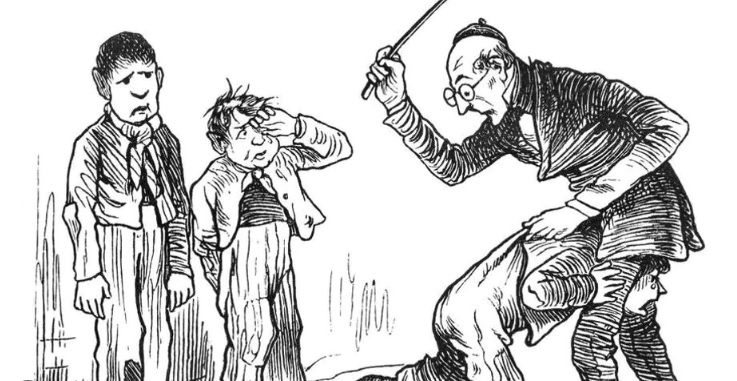
Removal of Corporal Punishment in Schools and its Impact on the Behavioral Landscape of Kashmiri Youth
Unintended Consequences: The Impact of Removing Corporal Punishment in Kashmiri Schools
By: Javid Amin
The state of Jammu and Kashmir, nestled in the lap of the Himalayas, has long been a symbol of breathtaking natural beauty, rich cultural heritage, and the resilience of its people in the face of adversity. However, recent developments in the region, particularly the removal of corporal punishment from schools, have started to paint a different picture. The consequences of this change are felt across all strata of society, but it is the impact on the younger generation that is most concerning.
The Controversy Surrounding Corporal Punishment : The use of corporal punishment in schools has been a subject of global debate. While some believe it’s an outdated, inhumane practice that infringes on a child’s rights, others argue that it can be an effective tool for discipline. In Kashmir, the administration decided to side with the former and banned corporal punishment in schools.
The rationale behind this decision was to create a more child-friendly, rights-based learning environment. However, as with any significant policy change, the consequences have been far-reaching, affecting the behavior and discipline of the youth in the region.
A Volatile Mix: Removal of Corporal Punishment and Socio-Political Turmoil : The timing of this ban coincided with a period of considerable socio-political turmoil in the region. Following the abrogation of Article 370 in August 2019, Kashmir saw significant changes in its political landscape. The region became a Union Territory under the direct control of the Indian central government. This transition not only brought about curfews and communication blackouts but also led to a sense of uncertainty and unrest among the populace.
In this environment, the removal of corporal punishment, which had traditionally been used as a disciplinary measure in schools, created a vacuum in maintaining order and discipline among students.
The Unintended Consequences : The ban on corporal punishment was celebrated as a step toward safeguarding the rights and dignity of children. However, the reality on the ground has painted a different picture. Several concerning trends have emerged that are having a significant impact on the behavior of Kashmiri youth:
Drug Addiction : Kashmir has witnessed a concerning rise in drug addiction among its youth. The absence of strict disciplinary measures in schools has, in some cases, contributed to an environment where experimentation with substances has become more common. Without fear of immediate consequences, students are increasingly drawn into the dangerous world of drugs.
Stabbing Incidents : A worrying rise in stabbing incidents among youth in Kashmir has been noted. Fights among students and even attacks on teachers are occurring more frequently. The absence of strict school discipline has created an environment where conflicts can escalate to violence more easily.
Rash Driving and Stunts : Reckless driving and dangerous stunts, particularly on two-wheelers, have become a common sight on the streets of Kashmir. The absence of fear of punishment, both at school and on the roads, is contributing to this dangerous trend. Road safety norms are being blatantly ignored.
Flourishing Flesh Trade : A shocking and disturbing consequence of the ban on corporal punishment has been the reported increase in flesh trade in the region. Vulnerable students are lured into this underworld, and the absence of fear of punishment has emboldened those who exploit them.
“Not My Kids” Syndrome
Perhaps the most concerning aspect of these consequences is the prevailing attitude among parents. Many believe that their children are immune to these issues. The “not my kids” syndrome has become a significant barrier to addressing these challenges. The belief that their children could never be involved in drugs, violence, or any illicit activities has left many parents in a state of denial.
The Role of Parenting and Society
While the ban on corporal punishment may have created a vacuum in school discipline, the responsibility of raising well-behaved, responsible children does not lie with schools alone. Parents, family, and society also play a pivotal role in shaping the behavior and values of the younger generation.
It’s essential for parents to recognize that they need to be proactive in guiding their children. Open communication, setting boundaries, and fostering a sense of responsibility are crucial aspects of parenting that can help address these challenges.
The Way Forward
The ban on corporal punishment in Kashmiri schools was a well-intentioned move aimed at creating a more child-friendly and rights-based learning environment. However, the unintended consequences, as outlined in this article, cannot be ignored.
To address these challenges, it is crucial for the government, schools, parents, and society as a whole to work together. A multi-faceted approach that combines effective counseling services, community awareness programs, and, when necessary, a revisit of school disciplinary policies is essential.
Kashmir’s youth is its most valuable resource. It is the responsibility of all stakeholders to ensure they are equipped with the skills and knowledge to thrive in a world filled with challenges and opportunities.

